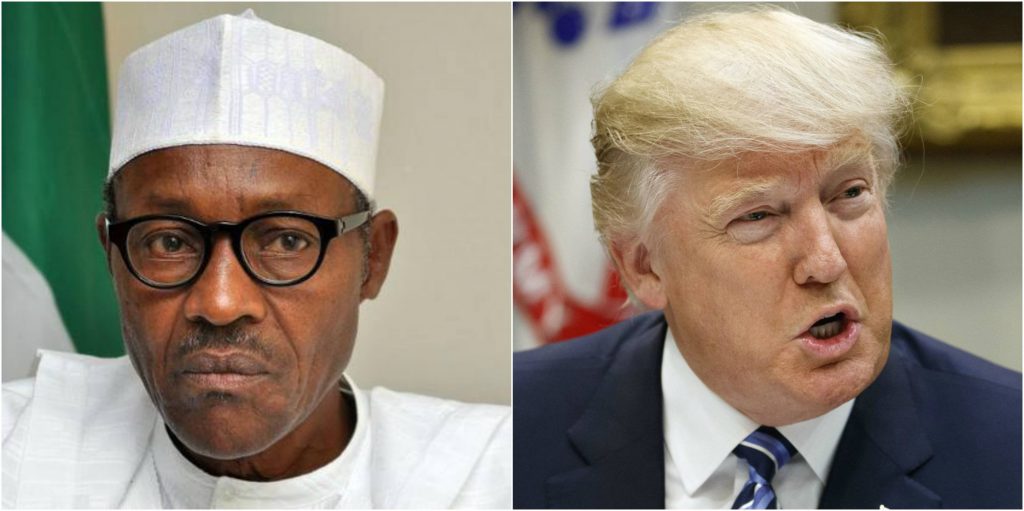The United States of America maintains its firm stand to deal with Nigeria on a government-to-government basis for the restitution of $500 million Sani Abacha’s loot, senior presidency sources have hinted.
Officials of the US Department of Justice (also known as DoJ), according to the sources, told President Muhammadu Buhari pointblank during his visit to the US that they would not deal with any third party in the restitution of the funds, the Cable reported.
Abubakar Malami, the Attorney-General of the Federation, had attempted to engage private lawyers who were going to take a cut as “legal fees,” even though they did not play any role in the recovery of the stolen funds traced to the former military head of state, Sani Abacha, who ruled Nigeria from 1993 to 1998.
The recoveries were made in 2014 under President Goodluck Jonathan and domiciled with the US government and all the lawyers involved had been paid four percent of the funds as their fees.
The funds were to be returned to Nigeria on the condition that the Federal Government would sign MoU to avoid the mismanagement associated with recoveries under ex-President Olusegun Obasanjo.
In 2016, however, Malami went ahead to appoint two Nigerian lawyers again in a pattern very similar to the $321 million Abacha loot recovered from Luxembourg also in 2014 for which the lawyers he hurriedly engaged were to be paid almost $17 million for doing nothing.
In the Switzerland case, Malami appointed Oladipo Okpeseyi, a senior advocate and Temitope Isaac Adebayo, in 2016 apparently to replicate the job already done.
Incidentally, Okpeseyi and Adebayo were lawyers to the Congress for Progressive Change, CPC, the APC legacy party of which Malami was the legal adviser.
He also proposed to use the same lawyers in the US case, but TheCable understands that the Department of Justice has consistently refused to entertain them, thereby stalling the return of the money to Nigeria.
America has now promised to return the $500 million but without the involvement of the appointed intermediaries.
The Nigerian government has also undertaken to spend the money on social protection programmes.
According to documents seen by TheCable, the DoJ initiated a legal action in November 2013 on the request of then Attorney-General, Mohammed Adoke, to confiscate assets worth $500 million traced to the Abacha family in France, Jersey and the UK.
Although the funds were not in the US, they fell foul of America’s money laundering laws having passed through the country in one form or the other.
Following a civil forfeiture complaint, the DoJ froze $280 million of Abacha Loot in Jersey, $140 million in France and $40 million in England.
Under US rules, any claimants to the asset were required to file a claim no later than 35 days after direct notice was sent to them or 60 days after the publication of notice.
Neither Mohammed Abacha, son of the late dictator, nor his companies filed any such complaint within the period until it expired.
Judiciary Is Not Father Christmas, Admits Onnoghen
“Judiciary is not Father Christmas,” admits Justice Walter Onnoghen, Chief Justice of Nigeria, CJN, with advice for prosecutors in the country to properly investigate cases before charging suspects to court, insisting that criminal justice system depends on efficient and effective functioning of all stakeholders.
Onnoghen, who spoke Monday at the opening ceremony of the 2018 National Workshop for Investigators and Prosecutors in Abuja, explained that the role of the judiciary as a key stakeholder in the administration of criminal justice can hardly be discharged without diligent investigation and prosecution.
He said: “I must emphasise that in all criminal trials, the prosecution must prove its case beyond reasonable doubt and this burden is discharged by the prosecution calling witnesses to give compelling evidence against the defendant with relevant exhibits to lend credence to oral evidence as the court is not Father Christmas that will give what you did not ask of it.”
The CJN pointed out “The prosecutors must always be guided to ensure that the spirit of Section 306 of the Administration of Criminal Justice Act 2015 is not subjected to abuse by parties in criminal matters.
“I am glad to say that, the provisions of the Administration of Criminal Justice Act (ACJA) 2015 has introduced innovations such as front loading of evidence at the time of commencement of an action, plea bargaining, limitation of adjournments, restitution non-custodial sentencing and forfeiture of assets, amongst others, are some of the innovations aimed at strengthening our Justice system.”
Onnoghen said decision to organise the workshop was borne out of the desire of the Education Committee of the Board of Governors of the National Judicial Institute, NJI to enhance the capacity and capability of investigators and prosecutors.
“This workshop serves as a forum to sharpen the prosecutorial and investigative skills of participants in view of the daily challenges you encounter in the discharge of your duties.”
In her welcome address, the Administrator of the NJI, Justice Roseline Bozimo, emphasised need for prosecutors to always carry out their functions with fairness and detachment, “with the sole and unadulterated objective of establishing the whole truth in accordance with the law.
“As prosecutors and investigators, your duties are tedious and require unbiased professional judgement and legal competence.
“The ultimate purpose of the criminal justice system is to uphold the rule of law, which is one of the most fundamental conditions for the sustainable development of any society.”

